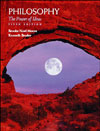| Alvin Plantiga | Holds that theists may accept the belief in God as a "basic belief", one that is rational to hold without supporting evidence and that is a foundation for the entire system of the theists' beliefs.
|
 |
 |
 |
| Argument by analogy | As in an argument for the existence of God the idea that the world is analogous to a human contrivance and therefore, just as the human contrivance has a creator, the world must also have a creator.
|
 |
 |
 |
| Argument from design | A proof for the existence of God based on the idea that the universe and its parts give evidence of purpose or design and therefore require a divine designer.
|
 |
 |
 |
| Contractualism | Ethical theories according to which right and wrong are established by a societal agreement or social contract.
|
 |
 |
 |
| Cosmological argument | An argument for the existence of God according to which the universe and its parts can be neither accidental nor self-caused and must ultimately have been brought into existence by God.
|
 |
 |
 |
| David Hume | A religious skeptic, provided classic criticisms of the teleological and cosmological arguments.
|
 |
 |
 |
| Epistemology | The branch of philosophy concerned primarily with the nature and possibility of knowledge.
|
 |
 |
 |
| Friedrich Nietzsche | Believed that the masses are ruled by a slave morality inculcated by religion, science, and philosophy. His statement "God is dead" meant that there is no rational order, not that people do not believe in God.
|
 |
 |
 |
| Gaunilo | A Benedictine monk, was a contemporary of Anselm and a critic of the ontological argument.
|
 |
 |
 |
| Gottfried Wilhelm, Baron von Leibniz | Proposed one of the most effective versions of the cosmological argument.
|
 |
 |
 |
| Immanuel Kant | Criticized the ontological, cosmological, and teleological proofs of God and thought God's existence cannot be proved, yet he believed that God's existence must be assumed by the rational, moral individual.
|
 |
 |
 |
| John Henry Newman | A famous nineteenth-century religious thinker, held that God's existence is evidenced by the experience of conscience.
|
 |
 |
 |
| Julian of Norwich | An English anchoress and mystic, argued that we are in God and God is in us. We learn about God by learning about ourselves.
|
 |
 |
 |
| Logical positivism | The philosophy of the Vienna Circle, according to which any purported statement of fact, if not a verbal truism, is meaningless unless certain conceivable observations would serve to confirm or deny it.
|
 |
 |
 |
| Mary Daly | A contemporary feminist analyst / critic of traditional conceptions of God.
|
 |
 |
 |
| Moral argument for the existence of God | The argument that maintains that morality, to be more than merely relative ad contingent, must come from and be guaranteed by a supreme being, God.
|
 |
 |
 |
| Necessary being | A being whose nonexistence is impossible.
|
 |
 |
 |
| Ontological argument | The argument that God's existence is entailed by the definition or concept of God.
|
 |
 |
 |
| Principle of sufficient reason | The principle that there is a sufficient reason why things are exactly as they are and are not otherwise.
|
 |
 |
 |
| Reductio proof | Proving a proposition by showing that its nonacceptance would involve an absurdity.
|
 |
 |
 |
| Rene Descartes | Offered three proofs of God, including a streamlined version of the ontological argument.
|
 |
 |
 |
| St. Anselm | The author of the ontological argument.
|
 |
 |
 |
| St. Thomas Aquinas | The author of the Five Ways of Proving God's Existence.
|
 |
 |
 |
| Søren Kierkegaard | Held that God is beyond reason's grasp, that truth is subjective, and that salvation can be attained only through a leap of faith to Christianity.
|
 |
 |
 |
| Vienna Circle | A group of philosophers and scientists centered at the University of Vienna in the 1920s and 1930s who espoused logical positivism.
|
 |
 |
 |
| William James | Held that it is rationally justifiable to yield to your hope that a God exists.
|



 2002 McGraw-Hill Higher Education
2002 McGraw-Hill Higher Education